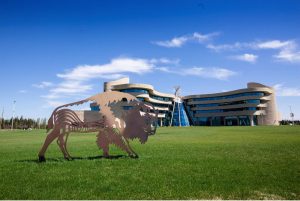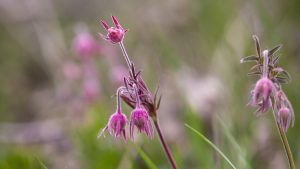The First Nations University of Canada is leading Indigenous-focused education and research, with a focus on preserving and advancing First Nations, Métis, and Inuit knowledge systems.
The First Nations University of Canada (FNUniv) is a unique post-secondary institution dedicated to providing Indigenous-led research and education. Established by the First Nations of Saskatchewan, Canada, in 1976 as the Saskatchewan Indian Federated College (SIFC), and renamed in 2003 when the institution moved to its new Regina campus building, FNUniv currently operates as a federated college of the University of Regina. The University’s mission is to enhance the quality of life and foster intellectual growth among Indigenous communities through culturally relevant education and research.
Research strengths
FNUniv is a leader in Indigenous-led research, with a focus on preserving and advancing First Nations, Métis, and Inuit knowledge systems. The University actively engages in interdisciplinary research, collaborating with Indigenous communities, academics, and government agencies to address contemporary issues affecting Indigenous peoples in Canada and globally.

Key research areas
Indigenous knowledge and language revitalisation
First Nations University conducts research on Indigenous languages, linguistics, oral traditions, and cultural knowledge, including language preservation initiatives in collaboration with Indigenous communities and the development of language learning tools and curricula.

In collaboration with the Saskatchewan Indigenous Cultural Centre, FNUniv researchers are currently engaged in a Heritage-Canada-funded project to document the Indigenous languages of Saskatchewan, with the ultimate goal of passing those languages on to future generations through both traditional and modern teaching methods, including the development of natural language processing models, machine learning, and artificial intelligence.
Health and wellbeing of Indigenous Peoples
Researchers at First Nations University study traditional healing practices and Indigenous approaches to medicine, health, and wellbeing, for example related to mental health, substance abuse, and trauma recovery research. For two decades, The Indigenous Peoples’ Health Research Centre (IPHRC) has been a leader in developing Indigenous health policy, Indigenous research ethics frameworks, and community-driven healthcare models.
Environmental stewardship and land-based research
FNUniv researchers study Indigenous land management, sustainable environmental practices, and traditional ecological knowledge (TEK). Particular issues of concern are climate change adaptation, water rights, conservation, and Indigenous-led resource governance. Researchers from the Department of Indigenous Knowledge and Science use First Nations University’s well-equipped laboratory spaces to conduct water quality investigations and to study the composition of traditional healing plants.
Indigenous governance, law, and reconciliation
First Nations University researchers have a long history of studying treaty rights, self-determination, and Indigenous governance structures. Faculty pursue studies in justice, law, and reconciliation efforts, including Truth and Reconciliation Commission (TRC) recommendations, and conduct community-based participatory research on Indigenous sovereignty.
Arts, media, and Indigenous storytelling
FNUniv researchers are engaged in the preservation of oral histories, storytelling, and digital media projects including Indigenous literature, film, and contemporary arts research. A current focus of FNUniv faculty is the role of media in shaping Indigenous identity and representation.

Research partnerships and collaborations
FNUniv works closely with national and international research institutions, Indigenous organisations, and governmental bodies. Key partners include:
- The Social Sciences and Humanities Research Council of Canada (SSHRC).
- SK-NEIHR.
- The Canadian Institutes of Health Research (CIHR).
- TRIUMF, Canada’s national particle accelerator centre, which conducts research in water quality and water purification.
- The National Centre for Truth and Reconciliation (NCTR).
- The National Centre for Collaboration on Indigenous Education (NCCIE).
- Indigenous-community-led organisations.
- The University of Regina and other academic institutions.
Research funding and support
The University receives funding from federal and provincial grants, private donors, and Indigenous-led funding initiatives. FNUniv researchers actively contribute to research projects through SSHRC and CIHR grants, as well as funding dedicated to Indigenous research initiatives.
Community-driven research approach
FNUniv emphasises a community-first research model, ensuring Indigenous voices lead the research process. This approach prioritises:
- Ethical research protocols aligned with Canada’s Tri-council Policy Statement on Research Ethics (TCPS2 2022), OCAP® (Ownership, Control, Access, and Possession) principles, and other Indigenous research ethics frameworks.
- Collaborative, participatory methodologies that respect Indigenous ways of knowing.
- Knowledge mobilisation to ensure research findings benefit Indigenous communities directly.
The First Nations University of Canada is at the forefront of Indigenous-led research, fostering innovation and knowledge exchange that empowers Indigenous communities. Through its commitment to language revitalisation, health research, environmental stewardship, governance, and the arts, FNUniv plays a vital role in shaping Indigenous scholarship and advancing reconciliation in Canada.
Please note, this article will also appear in the 21st edition of our quarterly publication.





